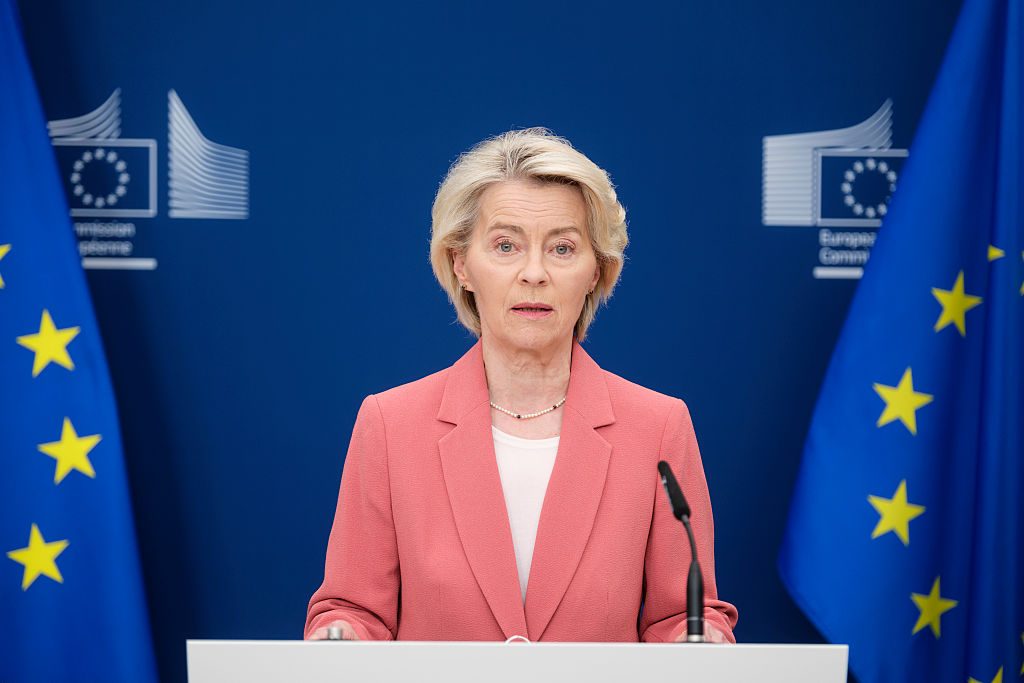Ursula von der Leyen’s 2025 State of the Union speech this morning was a case study in bureaucratic newspeak. It was the usual mixture of hollow promises, technocratic jargon, and moral posturing that the European Commission President has made her trademark.
The speech was filled with the Orwellian vocabulary of freedom, liberty, peace, prosperity and independence — even as the European Union continues to pursue policies which undermine all of these values. The bloc is pushing for militarisation, cracking down on free speech, sabotaging Europe’s economies with self-defeating energy and trade policies, and further subordinating the continent to Washington’s strategic agenda.
As expected, von der Leyen opened with Russia. “Europe is in a fight. A fight for a continent that is whole and at peace… a fight for our future,” she declared, announcing a new “European Defence Semester” and a “clear roadmap” for defence readiness by 2030. She was effectively stating that Europeans should prepare for a future marked by permanent militarisation, including a “drone wall” along the EU’s eastern flank and real-time space surveillance so “no movement of forces goes unseen.” She further pledged a “Qualitative Military Edge” programme for Ukraine and a “Drone Alliance” with Kyiv, partly financed by profits from frozen Russian assets.
Von der Leyen then turned to Israel, with whom the EU has not suspended any trade or cooperation treaties, let alone imposed sanctions. She announced that the Commission would “put our bilateral support to Israel on hold” and proposed sanctions on “extremist ministers and violent settlers”, along with a partial suspension of the Association Agreement. But by targeting only low-level actors and proposing measures requiring unanimous member state approval — a near-impossibility — this amounted to little more than a fig leaf to protect her proclaimed staunch alliance with Israel.
But it was on the economy where the speech truly descended into fantasy. Von der Leyen pledged a start-up fund with the aim of making the EU a leader in the field of tech and AI. Last year’s speech was full of similar promises — hardly any of which have materialised.
Addressing one of the main problems weighing on both European industry and households — high energy prices — she then made the astonishing claim that these were caused by “dependency on Russian fossil fuels”, rather than by Brussels’s decision to cut itself off from affordable Russian gas in favour of far more expensive American LNG. She compounded this distortion by insisting that “Europe is on the path of energy independence”, when in reality the continent has simply traded proximity for distance, becoming even more reliant on imports from far-flung suppliers exposed to volatile global markets.
Von der Leyen drew audible laughter when she proclaimed that “the future of cars, and the cars of the future, must be made in Europe” — a slogan that sounded absurd against the backdrop of stifling EU regulation of the continent’s auto industry. She even defended the recent EU-US trade deal — widely described as a capitulation — as “the best possible deal out there”.
But the most ominous part of the Commission President’s speech came when she spoke of “new tools” to enforce the rule of law and combat “information manipulation” and “disinformation”. To this end, she restated the need for a “European Democracy Shield” and “European Centre for Democratic Resilience” to counter supposed propaganda — foretelling more crackdowns on free speech and criminalisation of dissent, while announcing further EU-sponsored campaigns under the banner of “supporting independent journalism and media literacy”.
Ultimately, von der Leyen’s 2025 State of the Union was less a roadmap for Europe’s future than a catalogue of failures repackaged as triumphs. As usual, it blamed external enemies for Europe’s woes while ignoring the EU’s own supranational model, with its rigid political and economic constraints. By calling for even more centralisation, including an end to unanimity in key policy areas, von der Leyen signalled her intent to double down on the very policies that have weakened Europe. What she offered was not renewal, but more of the same: an ever more militarised, dependent and authoritarian Union.











Join the discussion
Join like minded readers that support our journalism by becoming a paid subscriber
To join the discussion in the comments, become a paid subscriber.
Join like minded readers that support our journalism, read unlimited articles and enjoy other subscriber-only benefits.
Subscribe